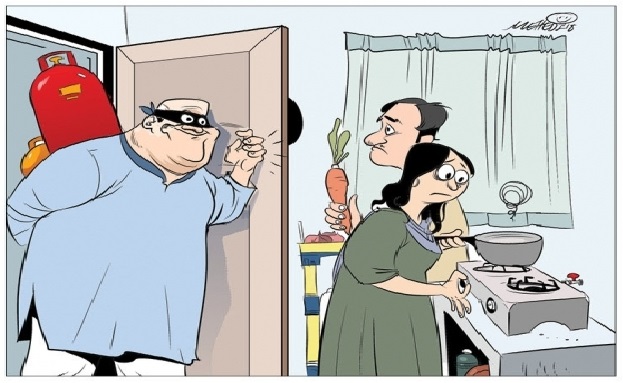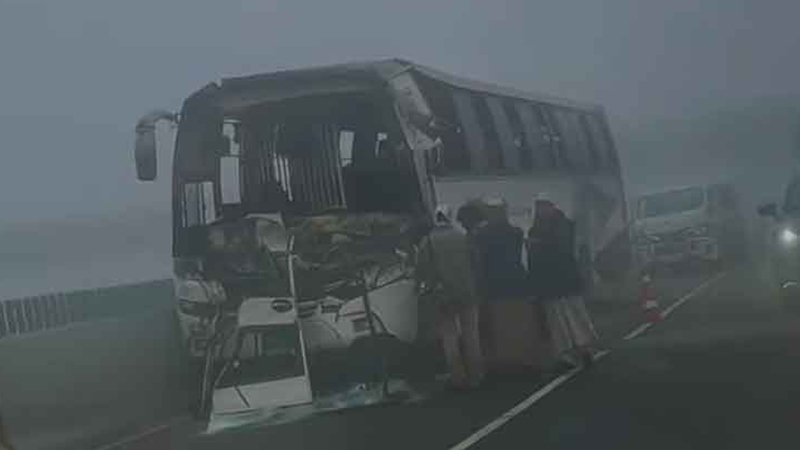Industrial and domestic consumers of piped natural gas have complained about a sudden drop in the gas pressure causing them sufferings and losses.
The gas crisis comes a month ahead of winter, when gas supply shortage reaches its peak because of an increase in its domestic demand for generating heat.
Energy and Mineral Resources Division said that the gas pressure fell because of a lower flow of gas through the national grid following a fall in the import of liquefied natural gas or better known as LNG.
Imported LNG is regasified and then mixed with natural gas from domestic sources in Bangladesh before being flowed through the national grid.
Bangladesh needs to import 1,000 mmcfd LNG but the average import remained around 600 mmcfd.
Lately, the import dwindled between 530 mmcfd and 540 mmcfd, according to Petrobangla.
‘The gas supply shortage is because of a fall in the LNG import,’ said power and energy state minister Nasrul Hamid.
He said that the government usually cut LNG import during the winter because of a drastic fall in gas consumption due to a reduced demand in the power sector.
Not a single winter in the past decade went without domestic consumers having experienced gas crisis, not even after they started paying 32 per cent extra for imported LNG 16 months ago.
Mahmud Group general manager Sudhangshu Kumar Dutta, however, said that his factory experienced low gas pressure for hours almost every day over the past two weeks.
‘There was no gas supply on Friday night without Titas Gas warning us about it,’ he said.
On Saturday, Petrobangla officials said that the gas supply stood about 3,000 mmcfd, far less than the estimated demand for about 4,000 mmcfd.
The national grid has never fully met the gas demand as the maximum national grid supply stays around 3,300 mmcfd, according to Petrobangla.
In January Petrobangla cited a lack in the distribution capacity for not being able to import 1,000 mmcfd. The gas tariff was raised by more than 32 per cent in August last year to improve the gas distribution infrastructure.
Energy expert and Dhaka University’s geology professor Badrul Imam said that no pipe line crisis should exist at the moment as per the government’s claim.
‘The import of LNG to the country’s full capacity would have minimised the gas crisis to some extent,’ said Badrul Imam.
Condensate may gather in greater concentrations in the pipe lines if the gas flow goes down amid falling temperatures further obstructing the gas supply to the consumers, energy experts said.
Authorities repeatedly cited condensation as the key reason for gas crisis. They also blamed gas theft for the crisis at times.
Energy and Mineral Resources Division secretary Anisur Rahman on Saturday told New Age that gas pipelines were exhausted from over use.
Consumer rights activists said that gas crisis would not have disappeared in summer had it been owed to overburdened distribution network.
‘These are all excuses. They are better at finding excuses than cure to a problem plaguing the people for over a decade,’ said Consumers Association of Bangladesh energy adviser Shamsul Alam.
He likened the unwillingness of Titas to explain to people the reasons creating the gas crisis to committing a criminal offence.
‘They just don’t care about people,’ said Shamsul Alam.
Titas is the largest natural gas distribution company in Bangladesh handling about 60 per cent of the country’s gas supply. About 70 per cent of over 4 million gas consumers live in Dhaka and are covered by Titas.
Titas also supplies gas to Mymensingh and Kishoreganj.
Titas does not have an estimate of the increase in domestic gas demand during the winter and it supplies 2.8 million burners with roughly 200 mmcfd, about 12 per cent of the gas it handles.
Power plants take about 450 mmcfd from Titas. It sells 40 per cent of its gas to industries.
‘We have a shortage of supply. We are trying to make sure that industries do not suffer from this supply shortage,’ said Titas managing director Ali Mohd Al-Mamun.
Friday and Saturday, however, are the days domestic consumers see a relative increase in gas pressure. The rest of the week they see their burners reduced to a weak flame from around 10:00 am to 2:00 pm.
‘The days of eating half-cooked food have returned,’ said Farhana Rahman, a resident of Gandaria, who has been unable to cook a proper meal for her family for two weeks because of low gas pressure.
Residents of Bashabo and Rampura also complained about low gas pressure.
Some of the affected households started visiting local carpentry shops to collect wood slivers to use them in their gas burner to increase the strength of its weak flame.
‘It is ruining my kitchen with its walls stained all over,’ said Mohua Akhter, a resident of Rampura.
Mohua also questioned the legality of Titas charging her the same fixed month













